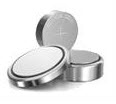Mercury in Batteries
The Mercury-Containing and Rechargeable Battery Management Act of 1996 prohibits the use of mercury in all other types of batteries. With the passage of this act, mercury-free alkaline batteries became the national standard for most types of batteries.
Button Cell Batteries

Button cell batteries are miniature batteries in the shape of a coin or button. They are used in small portable electronic devices such as watches, cameras, digital thermometers, calculators, and toys. Zinc air, alkaline, and silver oxide button cell batteries contain small amounts of mercury. These batteries do not pose a health risk when in use since the chances of the mercury leaking out are small.
The mercury in button cell batteries can escape into the environment after they have been thrown away and are either incinerated or end up in landfills. Though there are no federal regulations prohibiting throwing button cell batteries in the regular garbage, they should be recycled. If they are not recycled, almost all of this mercury in them can end up in waste that gets incinerated or landfilled. If incinerated, the mercury can end up back in the air; if landfilled, it could end up in groundwater, and potentially in sources of drinking water. In addition, keep in mind that states or municipalities may prohibit throwing button cell batteries into the trash.
Mercuric Oxide Batteries
Mercuric oxide batteries still are produced for military and medical equipment that need a stable current and long life. Federal law requires the manufacturer to have a system for collecting the used batteries and ensuring that the mercury is not released into the environment. Battery users must follow the collection procedures established by the manufacturer.
